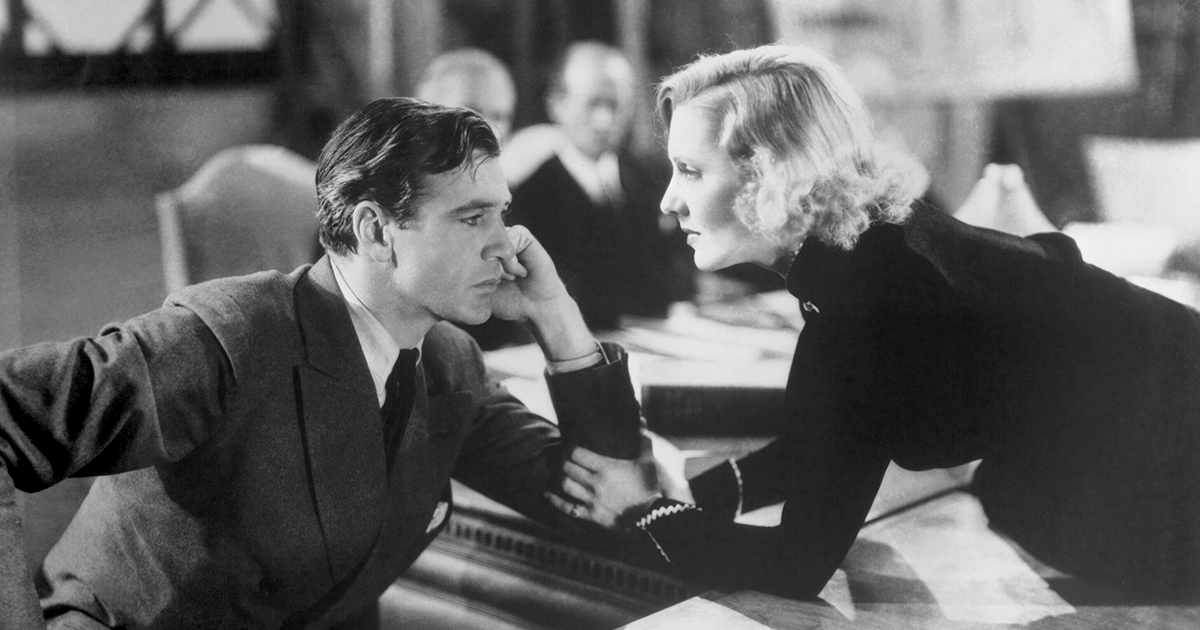[8]
Gary Cooper (Friendly Persuasion, Ball of Fire) stars as Longfellow Deeds, a small-town idealist who inherits twenty million dollars and moves to New York City, where he becomes increasingly frustrated with the myriad people who try to take advantage of him. He’s able to see through most people’s charades, but an ambitious news reporter (Jean Arthur) completely disarms him and wins his heart. She makes a mockery of Deeds in the press, but when she begins to develop genuine feelings for him, she decides to come clean — risking their burgeoning romance by revealing her deception. At the same time, greedy lawyers and nefarious relatives drag Deeds to a climactic courtroom trial to have him declared legally insane for his philanthropic spending.
Mr. Deeds Goes to Town is a Frank Capra film with strong similarities to other Capra films, namely Mr. Smith Goes to Washington and It’s a Wonderful Life. All three of these movies feature an idealist who does his best to help his community, only to be taken down by selfish opportunists gaming society’s institutions. Though Capra is basically telling the same story three times, each film is today regarded a classic in its own right. Mr. Deeds is most distinguished by its remarkable leading performance — perhaps my favorite in Gary Cooper’s career.
It’s rare to see a leading man from the Golden Age of Hollywood this vulnerable in a film. Cooper is truly devastated when he learns Arthur has deceived him. He doesn’t get angry like most men would — he loses faith in humanity and sinks into a deep depression. He doesn’t even speak throughout most of the film’s final act because the world around him has disappointed him so greatly. Cooper also allows himself to appear clumsy and awkward after he professes his love to Jean Arthur’s character. He backs away, trips and falls, gets up again, and runs into several extras on his way out of the scene. While his character certainly has his macho moments (including a couple of face punches to people who deserve it), Cooper’s performance is a well-rounded, fully human, welcome relief from the endless parade of two-dimensional macho men Hollywood has delivered over the past century.
Before Cooper shows his vulnerable side, though, he captures our attention with his down-to-earth relatability and some moments of grand humor. My favorite scenes in the film are between Mr. Deeds and his butlers (played by Raymond Walburn and two uncredited actors). Cooper argues with Walburn throughout the film whenever Walburn gets on his knees or gets too handsy while trying to dress Cooper. In another scene, Cooper is so giddy in love that he draws the three butlers out of bed to shout from the grand staircase and listen to their echoes reverberate throughout the mansion. The stuffy trio enjoy this uncouth moment. Cooper buttons the scene by saying, “Let that be a lesson to you.”
The climactic courtroom trial strains my suspension of disbelief, but as with any Frank Capra movie, you go along with it because you wish humanity would heed its better angels. Jean Arthur turns in a strong supporting performance, as does Lionel Stander as a gruff lawyer who grows to support Deeds. The lighting by cinematographer Joseph Walker (You Can’t Take It With You, His Girl Friday) is often quite striking.
With George Bancroft, Douglass Dumbrille, and H.B. Warner.
Academy Award: Best Director (Frank Capra)
Oscar Nominations: Best Picture, Best Actor (Gary Cooper), Best Screenplay, Best Sound Recording

